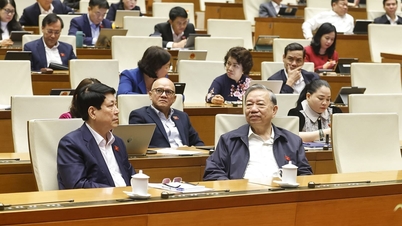Big Tech Wins AI Copyright Lawsuit: Network Content Becomes Free Data?
Two recent rulings in the US, including one involving Anthropic, which used millions of books to train AI, show that courts are leaning toward the view that any publicly available content on the internet can be legally used to train AI under the principle of fair use. This means that AI companies may not have to pay for text, images or videos they scrape from the web.

Big Tech is facing many legal challenges in developing AI. (Source: Yahoo)
This is a big win for Big Tech, but a threat to content creators, as AI can recreate entire digital knowledge in seconds, reducing the value of original content.
Several publishers, including The Atlantic, Time, and Ziff Davis, are partnering with Cloudflare to develop “AI pay-per-crawl” tools that force AI to pay for data collection, moving from an “opt-out” to an “opt-in” mechanism.
EU "ignores" Big Tech, keeps AI law roadmap intact
The European Union (EU) has just affirmed that it will continue to implement the Artificial Intelligence Act (AI Act) on schedule, despite pressure from more than 100 major technology companies in the world calling for a delay.
Companies such as Alphabet, Meta, Mistral AI and ASML have written to the European Commission, expressing concerns that the strict rules in the AI Act could undermine Europe’s competitiveness in the global AI race. However, European Commission spokesman Thomas Regnier made it clear: “There is no stopping the clock. There is no grace period. There is no moratorium.”

EU ignores Big Tech, keeps AI law roadmap intact. (Source: Techcrunh)
The AI Act is the world’s first piece of legislation to adopt a risk-based approach to regulating AI, which would ban AI applications deemed to pose “unacceptable risks” such as cognitive behavioral manipulation or social scoring.
“High-risk” applications such as facial recognition, AI in education or recruitment will have to comply with strict requirements on registration, quality management and risk assessment, while “low-risk” applications such as chatbots will only have to meet lighter transparency standards.
The EU has started implementing the AI Act in phases from 2024 and is expected to fully implement it by mid-2026.
Brazil arrests suspect in $100 million bank hack
Brazilian police have arrested a suspect in connection with a massive cyberattack on the PIX instant payment system that caused more than 540 million reais (about $100 million) in damage. This is considered one of the most serious cyberattacks ever to occur in this South American country.
The suspect arrested is João Roque, an IT employee of the software company C&M - the unit that connects financial institutions with the Central Bank of Brazil to conduct transactions via PIX. Roque confessed to selling system login information to the hacker group, helping them conduct a series of fake transactions in just one night.

Brazilian police on duty. (Illustration photo - source AP)
The $100 million loss is from just one financial institution, the total loss could be much higher. 270 million reals (about $50 million) have been frozen and police are searching for at least four other suspects involved.
Brazil's Central Bank has partially suspended the operations of software company C&M to prevent further spread of risks.
Source: https://vtcnews.vn/cong-nghe-5-7-toa-an-my-ra-phan-quyet-ai-duoc-dung-noi-dung-mang-mien-phi-ar952806.html



![[Photo] National Assembly Chairman Tran Thanh Man attends the VinFuture 2025 Award Ceremony](/_next/image?url=https%3A%2F%2Fvphoto.vietnam.vn%2Fthumb%2F1200x675%2Fvietnam%2Fresource%2FIMAGE%2F2025%2F12%2F05%2F1764951162416_2628509768338816493-6995-jpg.webp&w=3840&q=75)
![[Photo] 60th Anniversary of the Founding of the Vietnam Association of Photographic Artists](/_next/image?url=https%3A%2F%2Fvphoto.vietnam.vn%2Fthumb%2F1200x675%2Fvietnam%2Fresource%2FIMAGE%2F2025%2F12%2F05%2F1764935864512_a1-bnd-0841-9740-jpg.webp&w=3840&q=75)






































































































Comment (0)